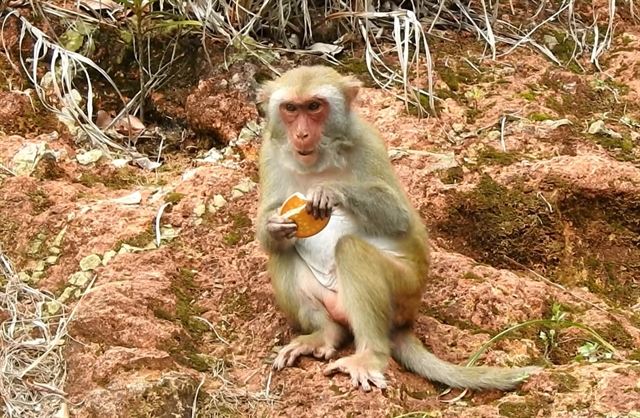 Society
Society

Authorities in the central city of Đà Nẵng have warned tourists not to feed local monkeys

|
| A monkey on Đà Nẵng's Sơn Trà Peninsula eats a cookie.. — VNA/VNS Photo Quốc Dũng |
ĐÀ NẴNG — Authorities in the central city of Đà Nẵng have warned tourists not to feed local monkeys, the Vietnam News Agency.
During the recent peak tourist season, a herd of wild monkeys have been frequently spotted to gather at the landfill behind Linh Ứng Pagoda on Sơn Trà Peninsula, scavenging for food, even when environment workers are present to burn the trash.
For a long time, tourists have used candies and fruits and other types of food to lure these monkeys into a position where they can be photographed.
Nguyễn Văn Hùng, a local street vendor, said the monkeys got used to being fed and began "asking" for food or agressively stealing it from tourists, sometimes causing quite a scene on the road which might result in accidents.
“They continue giving food to monkeys despite my warnings,” he said.
Researchers say that by feeding the wild animals, tourists have changed their living habits. From searching for food in their natural habitat, some monkeys have switched to food meant for human, which is not really good for their digestive system.
Ecologist Hà Thăng Long, founder of NGO Green Việt, said that in addition to the negative impact on the monkeys, direct contact between humans and wild animals increases the risk of diseases for both sides.
Dương Thị Xuân Liễu, head of the Tourism Management and Operation Department under the Management Board of Sơn Trà Peninsula and Đà Nẵng beaches, said the board had put up signs discouraging people from feeding the animals and urged tour operators and transport providers to warn tourists against such practices.
However, due to poor management and the lack of a mechanism to punish those who feed the monkeys, the situation has not seen much improvement.
Tourists are recommended to keep themselves safe and preserve the natural habitat for local wildlife by keeping their distance from wild animals. — VNS




